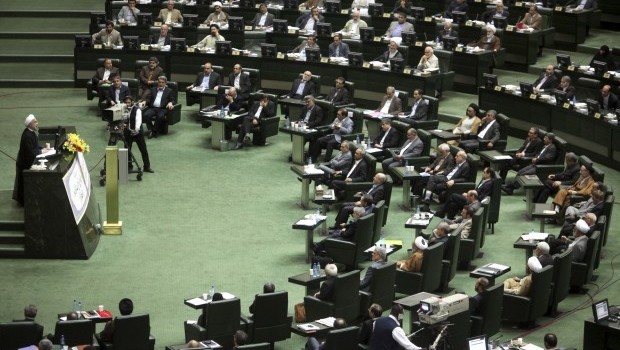
Iranian president Hassan Rouhani, center left, speaks during the debate on the proposed Cabinet at the parliament in Tehran, Iran, on Thursday, August 15, 2013. (AP Photo/Ebrahim Noroozi)
Gholam-Hossein Karbaschi, the secretary-general of the Construction Party, considered part of the reformist camp, said on Saturday that Iran’s leading reformist groups may reach an agreement to nominate Ali Akbar Nategh-Nuri as their lead candidate for the next parliamentary election in 2016.
Nategh-Nuri was Iran’s interior minister during the presidency of moderate conservative Akbar Hashemi Rafsanjani and also served as the speaker of Parliament from 1992 to 2000.
Nategh-Nuri was the most prominent conservative-backed candidate in the Iranian presidential election in 1997, but lost to reformist Mohammad Khatami in a landslide that surprised observers both in and outside Iran.
Since then, he has kept a low public profile as an adviser to both former president Hashemi Rafsanjani and Iran’s supreme leader, Ayatollah Ali Khamenei.
“Reformist parties will adopt rational and more active political approaches for the parliamentary election, and in view of Nategh-Nuri’s record and reformists’ general tendency toward him, reformists may gather around him as the lead candidate,” Karbaschi told Mehr news agency.
Some commentators believe that the appearance of Nategh-Nuri’s name in the reformist list for the next parliamentary election would be a sign of a real or imminent rupture within the Iranian conservative camp between moderate conservatives and the more hard-line conservatives, known as “principalists.”
Signs of a break between Nategh-Nuri and other conservatives have been noted by observers in the past. For instance, he did not attend an iftar ceremony held by a conservative party in July, where he had originally been billed as the keynote speaker.
If successful in getting Nategh-Nuri elected to the Majlis, it is also believed that Iranian reformists will pick the former conservative as their candidate for Majlis speaker, standing against incumbent conservative Ali Larijani. Nategh-Nuri would thus be a possible compromise candidate for the post, acceptable to both reformists and conservatives, given his background.
Meanwhile, other unconfirmed reports suggest that Mohammad-Reza Aref, the first vice-president under Mohammad Khatami, may emerge as a key reformist candidate in the next parliamentary elections.
But despite the victory of moderate Hassan Rouhani in Iran’s recent presidential election, considered a boost for the country’s beleaguered reformist movement, it seems that they are still facing many challenges in the country’s political arena.
In another sign of an ongoing rebalancing between the reformist and conservative camps, Iranian state TV reported Monday that Iran’s media supervisory body banned the Bahar newspaper, citing a law authorizing the closure of media outlets over articles deemed to violate Islamic values or insult Islam.
Although Iran’s judiciary has shut down more than 120 pro-reform newspapers since 2000, Bahar is the first reformist newspaper to be banned since Rouhani took power less than three months ago.
The article that led to the ban reportedly questioned whether or not the Prophet Mohammed appointed a successor, a statement that contradicts the beliefs of Shi’ite Muslims.
